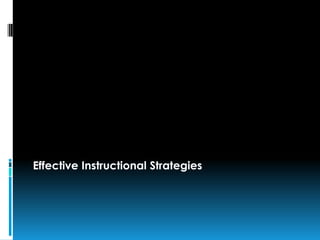
Research-Based Teaching Strategies
- 3. 1. Setting objectives and providing feedback 2. Nonlinguistic representations 3. Cues, questions, and advance organizers 4. Cooperative learning 5. Summarizing and note taking 6. Homework and practice 7. Reinforcing effort and providing recognition 8. Generating and testing hypothesis 9. Identifying similarities and differences Nine(9) Categories of InstructionalStrategies
- 4. Setting Objective Providing Feedback teacher can narrow the focus of the students should not be too specific because learning will be limited should be adapt by students to their own personal needs and desires should be corrective in nature the timeliness of feedback is essential to its effectiveness should be specific to a criterion students can provide their own feedback through on-going self- evaluation
- 5. Nonlinguistic Representations a variety of activities can help students to formulate nonlinguistic representations - use of graphic representations - pictures - mental images - physical and technological models - kinesthetic activities these help to elaborate knowledge
- 6. Cues and Questions Advance Organizers should focus on what is important rather than on what is unusual higher-level questions produce deeper learning than lower level-level questions waiting at least three seconds before accepting responses from students increases the depth of answers questions are effective even before a lesson begins are best used to give structure to information that is not well organized different types of organizers can be used for different purposes and produce different results
- 7. Cooperative Learning groups should rarely be organized by ability groups should be small teachers should take care not to overuse them
- 8. Summarizing and Note Taking students must keep, delete, and substitute information students must analyze the information at a fairly deep level be aware of the explicit structure of information verbatim note taking is the least effective way to take notes notes should be considered works in progress should be used for study guides for tests the more notes taken, the better
- 9. Homework should increase as they progress from elementary through high school parental involvement in homework should be minimal the purpose should be identified and articulated feedback should be provided
- 10. Reinforcing Effort Providing Recognition students are unaware of the direct effect that effort has on success students can learn that the effort they put into a task has a direct effect on their success strong belief in effort increases motivation rewards do not have a negative effect on intrinsic motivation rewards are most effective when they are contingent upon the attainment of some standard performance abstract recognition (praise) is more effective in improving performance than are tangible rewards (candy)
- 11. Generating and Testing Hypotheses can be approached in an inductive or deductive manner teachers must encourage students to explain their hypotheses and conclusions
- 12. Identifying Similarities and Differences teacher-directed activities deepen understanding for students and increase their ability to use knowledge students should independently identify similarities and differences graphic and symbolic forms enhances students’ ability to identify and understand similarities and differences comparing, classifying, creating analogies, and creating metaphors are four different forms of identifying similarities and differences
- 13. Hill, Jane D. and Kathleen M. Flynn. Classroom Instruction that Works with English Language Learners. Virginia, USA: Association for Supervision and Curriculum Development, 2006, pp. 5-103 Source: Kia S. Soneja BSE-ENG
